Issue Number 16, Spring 2012
Contents
- Prayer for Heaven by Carter McKenzie
- Buried Treasure by Peter Branson
- Canticle for the Cardinal by Lois Marie Harrod
- Crossing the River by Karen Terrey
- He's Got the Whole World by Barbara J. Genovese
- In The Confines Of Everything by Garth Pavell
- Mastodon Bones Found in Backyard Pond
Portland, Michigan by Laura Sobbott Ross - Milking by Lisa Wujnovich
- Ridge Developers by Barbara Swift Brauer
- Stones by Norman Minnick
- The Earth's Most Dangerous Predator by Robert Coats
- Vignette #32 by Grace Marie Grafton
- Wolf River by Roger Real Drouin
Archives: by Issue | by Author Name
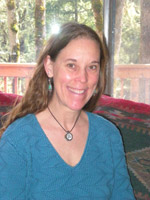
Prayer for Heaven
by Carter McKenzie
Carter lives in the foothills of western Oregon’s Cascade Mountains in the Middle Fork Willamette watershed near Lost Creek.

May it hold the sounds
of the raw seams of our world,
our difficult heart, the borders
always at war.
May it hold mercy.
May it never be
above and beyond
blossoms
scattering.
May it gather the blossoms beyond
the dark wall, on every side
revealing
an opening.
May it discover new names.
May heaven be generous, may
its own burning
sky,
its seraphim of infinite
moons and suns,
include every loss, even
the loneliness of the bones of a dog
floating
among the miracles of space
before the anonymous fall, the abandoned vessel’s
fiery descent, everything
gone wrong, may it include even
the loneliness of the dog.
May it hold in its eye
the deep blue
dream we keep trying to tell—
how the light falls apart,
then is saved
no matter what happens,
again and again, may heaven
be the singing, and may we be
forever changed.
© Carter McKenzie
Buried Treasure
by Peter Branson
Peter lives in the shadow of Mow Cop and Congleton Edge to the east, overlooking the Cheshire Plain westward, between the watersheds of Trent, Mersey and Dee.

‘Phylloscopus collybita’: the Chiffchaff
‘The Observer’s Book of Birds’ Eggs’
Relentless siren call from woodland reach,
restless, twitch of the breeze, one small tick on
the tree’s trembling clock face, is hard to pin
and focus on. Aged ten, you spot him in
your guide: dark undertow, so expertly
concealed from view, dome-shape, most difficult
of all small nests to find. Locating cold’s
impossible. You watch; he reads your mind.
And then one day, part doggedness, part fate,
the cradle stares you in the face, pearls, sheer
as porcelain and flecked with gold, inside.
Possession point-nine of the law, the itch,
eyes everywhere, to blow the evidence,
a live time-bomb warm in your fist, you pause.
© Peter Branson

Canticle for the Cardinal
by Lois Marie Harrod
Lois lives in the Stony Brook watershed in Hopewell, New Jersey, a sweet little town that has been here since the l8th century. Though close geographically, it seems far from the turnpike-oil-refinery New Jersey.

For his peaky cap in March gauze
above the junco capes, at the edge of the field, there, cardinal
For the cheer, cheer cheer in March fog
beyond the blue flit of obligation, thief and blessing, cardinal.
For the wet, wet, wet in March singe,
damp, his waxy wings among the cedar, cardinal.
For confession from the high ledge, tut, tut, tut,
bright sky scarlet as his churchy namesake, cardinal.
For the childlike whistle among the weeping cherry,
white blossoming among the misery, oh cardinal, cardinal.
© Lois Marie Harrod

Crossing the River
by Karen Terrey
Karen lives in Truckee, California, within sight of the Truckee River, part of the Lake Tahoe Watershed. The river runs about 120 miles from its source, Lake Tahoe, to its end in Pyramid Lake, just north of Fernley, Nevada.

After a record-breaking night,
slush flowed on top the river’s roil
like dirt specks floating across an eyeball,
tricking us into thinking something close
is far away. Ice vellum wrapped rocks along the shoreline
and air bubbles milled like field mice trapped beneath.
As close as it gets to freezing over,
each frosted branch
encased with eager light.
A panting buck on three legs by the black water line
and two fat coyotes nearby,
eyeing chickadees hopping along red willow bobbins.
Maybe he was resting
after a slow night of quiet stalking,
the coyotes trailing just close enough so he couldn’t stop
stumbling
through the frozen forest. It was beautiful,
how the gold of the coyotes’ manes
grew thick in the sun like a resolution.
The buck’s broken leg
bent beneath his chest, silent breath clouds.
Like a branch cracking beneath a storm’s weight,
he rocked across the icy river,
up a low bank,
across rusted railroad tracks,
heavy rack dipping and rising.
Standing, the coyotes watched as if they had just noticed
the mule deer, then trotted along the edge. It was beautiful
how the buck kept going. How he didn’t.
This poem previously appeared in Grey Sparrow Journal, Winter 2011/12
© Karen Terrey
He's Got the Whole World
by Barbara J. Genovese
Barbara lives on 35 acres of protected wetlands in the Fanno Creek Watershed in Portland Oregon, with about 640 other people cleverly landscaped into their houses. The area is home to a variety of wildlife species, most commonly those that can tolerate a wide variety of habitat and the disturbance usually associated with residential and commercial development, and some of the critters come in close!

He sleepwalks. I must not startle him. It’s as if I’m a wild animal stalking game, only it’s my own child that I follow.
As he approaches the weathered Earth globe in his father’s study, he shudders. I want to hold him and say: “You’re too young, too little for all that responsibility.”
Tears soon cascade down his cheeks. Splash. Splash. Splash. He takes a deep breath: “The Earth is shaking and calling up the ocean. It will wash things away.”
Japan’s tsunami of March 11 is a day away. But his predictions are never wrong. What frustrates him is that he cannot tell me where. Sometimes he’ll have an image of a landmark. Then we pour over books. It frustrates him to tears. I remind him that dreams and visions are sometimes puzzles. Rarely do images come fully formed from deep in our minds. That doesn’t comfort him. He needs to be able to know so that he can warn people.
“The Earth is shaking.”
“The Earth is a sentient being too,” I offer. “The Himalayas were once part of Africa. Or rather, the land mass that became the Himalayas. It broke away and drifted for a long time in the Indian Ocean until it bumped into China. The force of that bump created the Himalayas.”
The tears have stopped. His tiny contemplative frame slowly fills with resolve.
“I want to go and live with the wild things. Then I’ll know, as animals know. Then I can warn people.”
Each time he brings this up, my heart breaks into more pieces that began a long time ago to separate from some intransigent land mass.
I’ve learned not to question him. Neither do I encourage him, for he is a serious, dark little boy. He will be gone from me soon enough. I’ve dreaded the day since the day he was born. A mother knows these things.
“I would miss you,” is all I can manage.
He has no idea that it would shatter me -- let alone what it would do to his father. My fear is that he’ll wander away in the night. I’ll find his empty bed and his missing backpack. I’ll linger in his room to catch the last remaining smells of him -- sweetness transported on air until my DNA has attached itself to it.
God is punishing me with this one. God is getting back for what I did when I was too young and inexperienced, too independent and reckless to care for anything, let alone myself. God is punishing me.
I watch as my boy does what he’s done since he could first hold the globe. He closes his eyes. His vocabulary has changed with his age.
“When oil spills, I clean the water. I plant trees in the Amazon. I run my fingers through rivers and oceans and pull out the garbage.”
We have noticed that sometimes the globe glows. There are times when it’s suspended. We’ve recorded this on our mobile phones because the click of a shutter is absent -- almost like an owl flying on noiseless feathers. We’ve taken these photographs for the unbelieving.
Then he falls asleep. His father gently replaces the globe and I carry our boy into his room and lay him between the sheets. He talks in his sleep. We’ve recorded him. This is so that we have memory of him. His father thinks it is only a matter of time. I think of a haiku by Akahito, memorized in college, when I could not hold babies in my belly: “The mists rise over the still pools at Asuka. Memory does not pass away so easily.”
We do not confine or restrain his activities in any way. He’s a bright light that we do not wish to extinguish. We believe he will be easy to find when he leaves.
An image persists of a family I babysat for when I was a girl. The mother told me a story about her daughter who was three when she died. The day before, she told her mother that she saw an angel. She told her mother that she was going with it. The angel told her not to be afraid.
I remember the look on the mother’s face. I see where we stood on the stairs so she could point to where her daughter stood. Her look haunts me. It is why I do not turn on the light in the bathroom. I’m terrified that perhaps her look has now transfigured my face.
I’ve seen my boy in dreams, waving goodbye. He assures me that he’ll not leave until there is absolutely nothing more he can do by holding the Earth globe. He assures me that where he is going, there will be ministering hands. He assures me that those ministers assure him that what he does for the Earth will be utilized wisely and well.
He assures me that he has been assured.
© Barbara J. Genovese
In The Confines Of Everything
by Garth Pavell
Garth lives in the Southern Long Island Watershed of Brooklyn, New York, where urban nature flourishes between Gravesend Bay and the Verrazano Bridge.

In the confines of everything I often find myself
Going for a walk on windy cold clear nights
Stars glittering mindless ancient celebrations
The sum of which may inadvertently torpedo
Someone else’s vegetables – a distant garden
In a world not unlike our own, full of distractions
Ceremonial conflicts that make their world go
Round the unfound merry-go-round, ooh feel that
Woozy earthbound meter clubbing in our
Mother ship’s undertow, an example there is
Life beyond congressional shoe shines and yahoo news
A simple walk at night when the wind is bubbling
Vindicating the monotony of creative mathematics
Proves we devour the secretions of billions of mamas
Invitations are everywhere, awkward family reunions
Punctuate the glory of being rock candy, suckling
Sunsets that set countless tablecloths on fire
Dinnertime is a moody serial killer of protein
Feeding us bread crumbs of ineffectual romance
Across the boo hoo tightrope of increased workdays
Only Oblivion’s psychedelic keyholes seem to know
Of my little trips with hat and gloves, strolling to hurry home
© Garth Pavell

Mastodon Bones Found in Backyard Pond
Portland, Michigan
by Laura Sobbott Ross
Laura lives in central Florida in the Upper St. John's Watershed.

All they’d wanted was a fish pond.
Trout and bass for him to chum
with stale bread and a spotlight
knifed across ripples rocking
the water lilies, soft as origami.
Maybe a willow or a pink
dogwood for her, a thatched feeder
for the winter finches, but not these
bones, these gargantuan femurs,
these ribs unhooked from the spine
of consecrated earth. All this time,
something ancient asleep out there
between the stakes they’d walked
in canvas shoes to mark the particulars
of their dreaming. The mastodon,
predating Moses, a fossilized
anecdote for hunger, buried by hunters
who never came back for what slid
beneath the glacier’s pale blue hull.
The species of elephant, pachyderm,
mamut americanum, morphing,
in the meantime, into something
more compact and willing to be lead
in circles or lift spangled ladies
into stale cupolas of striped tents.
Not like this wildness unsettled
in the shallows of a would-be pond.
Tusk and toe and kneecap already
sifted from toppled topography,
the his-and-her map of exacted landscape—
borders of hosta, flagstones, a trellis
twirled in clematis. Still, she would pan
the up heaved site for teeth, old as stars,
scattered in dark, humid loam.
© Laura Sobbott Ross
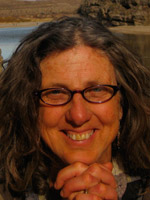
Milking
by Lisa Wujnovich
Lisa lives, farms, and writes poetry at Mountain Dell Farm on the New York side of the Delaware River Basin.

It’s warm inside
the dried-blood painted barn.
Danny trowels
the sweet manure soup,
scrapes the concrete.
I stand back from the slurry
splashing from the hind-end;
watch him wipe the teats,
attach the flopping pump hose,
talk about weather and gas drilling.
We move to the next cow—Careful.
This one kicks just like her mother.
Veined udders let down spray.
Twenty two years I’ve come for milk,
watched him dump the foaming white.
Cynthia had her chemo yesterday,
today she limps, chilled in coveralls,
hauling five gallon buckets of feed.
Outside, a silver milk truck
blows smoke, siphons pasture
to New York bellies—11 cents a pound.
Farmers all gone broke.
White wisps, like thoughts, hover
over pregnant countryside.
I try not to blame my good neighbors
for signing the gas lease.
Try not to imagine the slam-dunk-bam-
pistol-whip waterboarded earth
pissing herself, vomiting
slick secret ipecac gas frack juice,
poisoning our children’s children.
© Lisa Wujnovich
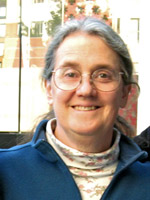
Ridge Developers
by Barbara Swift Brauer
Barbara lives in the Lagunitas Creek watershed in the San Geronimo Valley, the last un-dammed headwater tributary of Lagunitas Creek. Her home is within earshot of ephemeral and year-round creeks, just down the road from the fish ladder where coho salmon can be seen along their annual journey upstream to their spawning grounds.

You can smell them coming, welcome
as a cane toad, grateful to gain a toehold
where they do not belong. Soon
to swallow what they can, and poison
what they can’t.
Imported from an alien climate,
hell-bent on usurping yours, they come armored
with rolled deeds and developer’s plans, airtight legal.
Soon they’re into the lay of the land,
marking up the wild places, calibrating the angle
of sunset and rise for their living room windows.
You’ll come to know
the wide smile, the handshake that sizzles
as you seize it, the eyes that see right through you
to the future they are going to ruin.
And you can hear in their friendly voices
the chain saws revving for the very trees
now holding your horizons.
© Barbara Swift Brauer

Stones
by Norman Minnick
Norman grew up in Louisville, Kentucky, situated between two plateaus, the karst plateau of Southern Indiana and the Bluegrass plateau of Kentucky. He misses the wide, muddy Ohio River; the lush, craggy landscape; the caves and natural springs; and the nearby Appalachian Mountains. He is currently surrounded by corn and soybean fields in flat central Indiana.

Stones we pulled from hard earth clay
because the good soil had been excavated
from this former corn and soybean field
then bagged and sold to owners of new homes
the construction company plans to build
in neat rows along a cul-de-sac
now line the edge of our garden and rest
peacefully like sleeping Buddhas or
tortoises sunning themselves among
sorrel and bindweed, timothy and pine mulch
showing their ancient mossy faces as they
gradually sink into the ungovernable earth.
© Norman Minnick
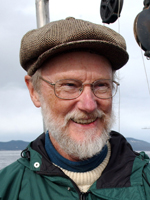
The Earth's Most Dangerous Predator
by Robert Coats
Bob lives in the watershed of Blackberry Creek, a small urbanized but partially-restored tributary of San Francisco Bay. He may also be found occasionally in the Tahoe basin, where he is studying the impacts of climate change.

Off Greenland,
ice-flow melting beneath his feet,
the bear heads southeast
through spume-flecked gray seas.
Days later, bone-tired and hungry,
he makes landfall at Skagafjordur.
Hauls out, goes shambling down
a country road, exploring his new home.
People gather to see him.
With fog descending,
no darts on hand, the police decide
to do what they do best.
You can watch the video:
the bear lumbers across talus,
alpine fells, pausing
to sniff the wind.
You hear the crack and echo of two shots,
see him lurch and stumble,
the blood-stained white fur,
vermillion congealing
in volcanic gravel beneath his neck.
The policeman’s hand, pulling back
a lip to show the fearsome
sharp teeth.
© Robert Coats
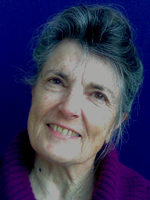
Vignette #32
by Grace Marie Grafton
Grace lives in the wooded hills of Oakland, California, in the Sausal Creek watershed. Outside her kitchen door is a second growth redwood tree, part of a landscape that was blanketed with old-growth redwoods at the time of the California gold rush, and a short walk east from her house is the wilderness area of Redwood Regional Park, where she loves to hike.

The impractical. The practical. The run-away. Garden. Wilderness. What’s wilderness now? She says, “uncultivated area,” when taking her students for a field walk. “Enter the uncultivated area of your mind.” They wouldn’t understand language like that, they’re just kids, surprised she knows the definition of ‘salubrious.’ She isn’t sure she knows the meaning, what is it, these days, to be healthy? Does it mean: to enter into the uncultivated, that part of mind/earth that is still diversified? Diversified farming, meaning: planting several crops in the same acreage. The beans feed the trees, wildflowers not only for beauty and history. Farming is cultivation; the meaning of ‘cultivated’ is: to be aware of the value of art and the past, to listen to the classics, read the Greeks (among others), speak more than one language. The “wild child” (discovered here and there) may know no words or may have created a unique language, and so the vocal cords were developed, but one such wild child, after learning to speak his teacher’s tongue, could not recall what his life was like when he was ‘wild.’
© Grace Marie Grafton
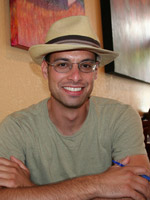
Wolf River
by Roger Real Drouin
Roger lives about halfway between the Atlantic Ocean and the Loxahatchee Slough region of the Everglades Watershed, where he spends many afternoons hiking and photographing.

Oscar put the diesel in four-wheel-drive-low, and let it motor down the two-rutted trail into the valley, letting his thoughts wander also, back to being a kid fishing for trout in the river with his old man.
After three months, he knew the job, knew what to do from seven in the morning to four thirty, and most of the time he didn’t have to talk to the boss or anyone else. Jim would always be the one to pick up the two-way or to check in with the project manager when they had to. It would be easy to go on with it. But Oscar didn’t know if he could much longer.
He wasn’t sure he could endure the metal-cold feeling churning in his stomach every morning as he sat in the truck those two extra minutes before he stepped down onto the gravel, towards the clanging, metal-scratching constant buzzing. What would his Pap think of his job now, being sent out to pick up the first trout killed in these mountains by the small trace of carbon that seeped into the river?
“I know where it is,” Oscar said.
“OK.” Jim put the topo map up on the dash.
“You know to go right where it forks?”
“It’s not for a while.”
They passed into the white pines and the big ferns. The pines arched tall, blocking out the sun.
“Did you see Patterson’s new Rubicon?” Jim asked.
“Yeah, I saw it in the lot.”
“That’s a beautiful Jeep, man.”
Oscar knew his Pap would have understood. The old man would have known how his son felt in the morning, and he would have stood by him. Maybe Carla would understand too, like his Pap would have. She would—he hoped. Maybe it would be better after he did tell her. She might already know that he couldn’t do it any longer. She knew what kind of man he was. She could always read what he was really thinking.
But Jim, his old friend from high school, would think he was crazy. He’d probably start on about the pay. He’d remind him they were fixing to bring in eighty this year. Where the hell else can a blue-collar guy with no college education make half that pay? He’d mention Oscar’s old Ford, past the two-hundred-fifty-thousand mile mark, frame rusting through, and his two little girls—how there ain’t no work, nothing, out there. How six months ago, they were both taking unemployment for the first times in their lives.
A little past four p.m., Oscar sat in the truck. Jim was inside the trailer with the Conoco-Phillips sign talking to the boss.
Outside, the air was pale-copper and the wind splintered against the truck.
Jim walked out. With the smell of petroleum and sweat, he stepped up, the tattoos on his forearm, his dark hair and stubble on his face, and he leaned back in the vinyl. Was this really the same clean-cut boy who ran the eight hundred meters like a fox and had wanted to be a jet pilot, turning the track, leaning his lean frame, muscles in his legs patient, reaching, striving through the sprinkling March rain ten years ago? That was the kid who became the man sitting next to him.
“He says to go back tonight.”
“To the river?” Oscar asked.
“Yeah.”
So Oscar went home to have dinner with his wife and two girls. He kissed his wife, and she said she’d wait up for him. He told her to go to sleep, to get a good night’s rest, and he stepped out into the quiet night.
The lean, searching wolf stood on the river bank. The wolf, long-legged, big-eared, white-faced, looking into the water, sniffing the rocks. The wolf unaware of the two men above—their clumsy footsteps down the trail still too distant to hear. The wolf unaware of the machines and the invisible poison that would come and kill more fish. Old eyed, looking out, she heard the men now approaching, and she was gone, disappearing back into the pines.
By the river, it was easy for the two men to work under the full moon shining down like a spotlight erected for the constructions of men.
They placed thirteen dead fish into a black trash bag.
In the morning, the sun came through the blinds. Two girls came running in “Daddy. Wake up. Time for breakfast.”
His wife ducked in. “Girls. Leave dad alone. He was up late at work. He’ll be out soon.”
Oscar figured he should catch a few more minutes of sleep if he could, and when he closed his eyes all light faded from his retina into darkness. Then all he could see under his closed eyelids was the river running in a crimson blood red. He put his hand into the river turned thick, steam-hot crimson sludge.
This story first appeared in "CROSSTIMBERS: A Multicultural and Interdisciplinary Publication of the University of Science and Arts of Oklahoma Foundation.
© Roger Real Drouin